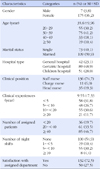Abstract
Purpose
The purpose of this study was to analyze factors affecting work engagement and burnout among clinical nurses according to resilience.
Methods
The study design was a descriptive survey and questionnaires were collected from 182 clinical nurses who worked in hospitals in "J" province. Data were analyzed using frequency, percentage, mean, standard deviation, independent t-test, one-way ANOVA, Scheffé test, Pearson correlation, and hierarchical multiple regressions.
Results
The mean score of resilience, work engagement, burnout were 3.47±0.38, 4.29±0.98, 2.25±0.82 respectively. Resilience had 26.3% of the influence on work engagement and 50.5% of the influence on burnout. Sub-variables of causal analysis and empathy of resilience were statistically useful as factors influencing burnout.
Figures and Tables
References
1. Abdelhadi N, Drach-Zahavy A. Promoting patient care: Work engagement as a mediator between ward service climate and patient-centered care. J Adv Nurs. 2011; 68:1276–1287. http://dx.doi.org/10.1111/j.1365-2648.2011.05834.x.
2. Baik DW, Yom YH. Effects of social support and emotional intelligence in the relationship between emotional labor and burnout among clinical nurses. J Korean Acad Nurs Adm. 2012; 18:271–280. http://dx.doi.org/10.11111/jkana.2012.18.3.271.
3. Bakker AB, Demerouti E. The job demands-resources model: State of the art. J Manag Psychol. 2007; 22:309–328. http://dx.doi.org/10.1108/02683940710733115.
4. Cho EA, Oh HE. Effects of laughter therapy on depression, quality of life, resilience and immune responses in breast cancer survivors. J Korean Acad Nurs. 2011; 41:285–293. http://dx.doi.org/10.4040/jkan.2011.41.3.285.
5. Choi HY, Chung NW. Perfectionism tendency, social support, and burnout among counselors. Korean J Health Psychol. 2003; 8:279–300.
6. Choi JH, Kang HA. Job stress, personal resources, burnout, and work engagement in child counselors. J Korean Child Care Educ. 2012; 8:231–252.
7. Dyer JG, McGuiness TM. Resilience: Analysis of the concept. Arch Psychiatr Nurs. 1996; 10:276–282. http://dx.doi.org/10.1016/S0883-9417 (96)80036-7.
8. Edelwich J, Brodsky A. Burn-Out: Stages of disillusionment in the helping professions. New York: Human Sciences Press;1980.
9. Garmezy N. Children in poverty: Resilience despite risk. Psychiatry. 1993; 56:127–136.
10. Gillespie BM, Chaboyer W, Wallis M, Grimbeck P. Resilience in the operating room: Developing and testing of a Resilience Model. J Adv Nurs. 2007; 59:427–438. http://dx.doi.org/10.1111/j.1365-2648.2007.04340.x.
11. Hong S. Concept development of resilience-focusing on cancer patients. J Korean Acad Soc Nurs Educ. 2009; 15:109–119.
12. Kim BN, Oh HS, Park YS. A study of nurse's resilience, occupational stress and satisfaction. Korean J Occup Health Nurs. 2011; 20:14–23.
13. Kim DH, Yoo IY. Relationship between depression and resilience among children with nephrotic syndrome. J Korean Acad Nurs. 2004; 34:534–540.
14. Kim GM, Park EY, Lee YS, Lee JN. Resilience of families with elderly patients with dementia. J Korean Acad Psychiatr Ment Health Nurs. 2012; 21:197–209.
15. Kim JW. Resilience. Goyang: Wisdom house Inc;2011.
16. Kown SH, Lee SY. An analysis of kindergarten teachers' resilience. J Korean Teach Educ. 2010; 27:137–157.
17. Lee AS, Yoon CK, Lee JM. Influence of ego-resilience and social support on the depression of hospital nurses. Korean J Occup Health Nurs. 2012; 21:46–54.
18. Lawrence LA. Work engagement, moral distress, education level, and critical reflective practice in intensive care nurses. Nurs Forum. 2011; 46:256–268.
19. Maslach C, Jackson S. Maslach burnout inventory manual. Palo Alto: Consulting Psychologists Press;1981.
20. Park EH, Jeon SB. The investigation of risk factors and protective factors that influence resilience in kindergarten teacher. J Korean Teach Educ. 2010; 27:253–276.
21. Park MS. The factors that affect work engagement and work burnout for nurses. Seoul, Korea: Kyung Hee University;2010. Unpublished master's thesis.
22. Reivich K, Shattéa A. The resilience factor. New York: Broadway Books;2003.
23. Sawatzky JV, Enns CL. Exploring the key predictors of retention in emergency nurses. J Nurs Manag. 2012; 20:696–707.
24. Schafeli WB, Salanova M, Gonzalez-Roma V, Bakker AB. The measurement of engagement and burnout: A confirmatory factor analytic approach. J Happiness Stud. 2002; 3:71–92. http://dx.doi.org/10.1023/A:1015630930326.
25. Seligman MEP. Positive psychology, positive prevention, and positive therapy. New York, NY: Wiley;2002.
26. Setti I, Argentero P. Organizational features of workplace and job engagement among Swiss healthcare workers. Nurs Health Sci. 2011; 13:425–432. http://dx.doi.org/10.1111/j.1442-2018.2011.00636.x.
27. Sim MK, Shin YH, Kim TI. Resilience, coping and adjustment to illness in children with chronic illness. J Korean Acad Child Health Nurs. 2006; 12:151–159.
28. The Resilient Educator. Skills to succeed and flourish in today's schools. 2007. Retrieved April 26, 2013. from http://www.heartmath.org/training/educators/resilient-educator.html.
29. Yi R, Gim WS, Shin KH. The role of emotional labor strategies in the job demand-resource model with burnout and engagement. Korean J Ind Organ Psychol. 2006; 19(4):573–596.




 PDF
PDF ePub
ePub Citation
Citation Print
Print







 XML Download
XML Download